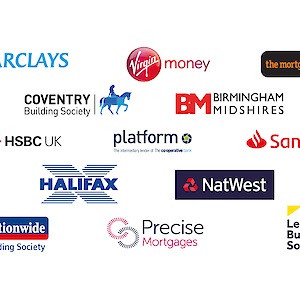


Head of Content

Mortgage Advisor & Director

Having an Individual Voluntary Arrangement (IVA) can make it difficult to secure finance, such as a mortgage. If you're applying for home finance with this form of bad credit, you'll need the right advice, and you’ll find that here.
In our guide to getting a mortgage with an IVA, you’ll learn whether approval is possible, what the lending criteria will be and how our brokers can help.
What is an IVA and how do they affect mortgage applications?
An individual voluntary arrangement, or an IVA, is a formal document between a creditor and a debtor that states in writing how money owed will be repaid over a specific period. They are set up by insolvency practitioners and approved by a court to make them legally binding.
The insolvency practitioner’s role while the IVA is active is to act as an intermediary between the debtor and creditor. Payments are made directly to them so they can deduct any fees they are entitled to before passing the funds on to the creditor. Most IVAs last for five years.
When a creditor agrees to one of these arrangements, interest and charges on the original debt are frozen, and any debt outstanding after the IVA has ended is written off.
Having an IVA can make it difficult to successfully apply for a mortgage because lenders consider them to be one of the more severe forms of bad credit, and many will be reluctant to approve you. Furthermore, it can be incredibly difficult to save for a deposit because insolvency practitioners insist that all disposable income must be used to settle the IVA.
You are legally required to declare any IVAs you have when applying for a mortgage.
Can you get a mortgage with an IVA?
It’s not impossible to get a mortgage while in an IVA, but it is incredibly difficult, because you will need permission from your insolvency practitioner to apply, and they usually insist that all disposable income is being used to settle the debt. Even if you can overcome this hurdle, your choice of approachable mortgage lenders will be sorely limited if the IVA is active.
IVAs remain on your credit reports for six years after they were approved, but it’s possible to secure a mortgage once it has been paid off. Speaking to a mortgage broker is, however, recommended because some lenders won’t even approve you with a satisfied IVA showing up on your record, while others might charge a higher interest rate.
Can you get a joint mortgage with an IVA?
Yes. If you are applying for a joint mortgage and one of the applicants has an IVA, the mortgage lender will still apply the same criteria as they would for a solo application with an IVA present. With one applicant having clean credit, however, the overall strength of your application may increase depending on how eligible the both of you are in other respects.
Leaving the applicant with the IVA off the application is technically an option, but this would become a solo mortgage and the other person would have no legal right to the property.
How long should you wait to apply?
There’s no reason why you can’t apply for a mortgage as soon as the IVA has been discharged, but keep in mind that the IVA will remain on your credit files for six years in total. There is only a small minority of lenders who will approve you in the first year after discharge.
The good news, however, is that your chances of securing a mortgage will gradually improve over time. There are more than 40 mortgage providers available for prospective borrowers whose IVA was satisfied between two and five years ago.
After the six-year mark, the issue will be removed from your credit reports and should not have an impact on any future financial applications, including any mortgages you apply for.
Lending criteria for people with this bad credit type

Lenders typically use the criteria below to assess whether applicants with individual voluntary arrangements are eligible for a mortgage:
- How long ago the IVA was: Most mortgage providers will need the IVA to be satisfied. Only a handful will approve you one year after discharge, but the number of approachable lenders, rates and deals will steadily increase after the two-year mark.
- Deposit amount: You will typically need to put down extra deposit if you have an IVA on your credit reports. This could be up to 30% of the property’s value, although 10-20% may be accepted if the IVA was satisfied more than three years ago.
- Financial conduct: Most mortgage lenders will expect you to evidence responsible financial conduct since the IVA was registered, such as paying all bills and any debts on time and in full, avoiding payday loans and living within your means.
- Age: A specialist mortgage lender might be called for if you will be over 75-85 years old during the term of the agreement, as some providers might be concerned about your ability to continue making mortgage payments well into your retirement.
- Property type: If you’ve had an IVA and are buying a non-standard property - i.e. one that isn’t built from bricks and mortar or has unusual features - this can be an added complication. Approval is still possible but professional advice is recommended.
The criteria above was sourced from Criteria Brain and Knowledge Bank.
How to get a mortgage with an IVA
We recommend following the steps below to begin your mortgage application the right way:
Get your documents ready: Having the necessary paperwork to hand can help save time in the long run. You’ll need proof of ID, address and three months’ bank statements. In addition to this, you should provide proof that your IVA has been discharged in the form of a completion certificate from your insolvency practitioner.
Check your credit reports: This is highly recommended as it will allow you to review the status of your IVA, but also to pick up on any inaccuracies and outdated information. Requesting to have these errors removed can strengthen your application. Head to Checkmyfile to access a trial and download your reports for free.
Speak to a mortgage broker: There are mortgage brokers at Teito who specialise in helping borrowers with IVAs get onto the property ladder. With their knowledge, experience and lender contacts, they can increase your chances of mortgage approval as well as ensure you secure the most favourable interest rate available.
Ready to get started with a mortgage broker who specialises in IVAs? Make an enquiry with us to access a free, no-obligation chat with one of Teito’s five-star-rated advisors today.
How much will you be able to borrow?
Having a satisfied IVA won’t have a direct impact on the amount you can borrow as this will largely be determined by your income and outgoings. Most lenders will cap your maximum borrowing at 4.5 times your annual salary, though some might offer more than this.
Other mortgage providers might offer 5-5.5 times salary under the right circumstances, and a few even stretch to 6 times salary. But keep in mind that the higher income multiples might be more difficult to access since your IVA could limit the number of deals available to you.
You can use our calculator below to get a clearer idea of your maximum mortgage borrowing:
Available mortgage lenders
Mortgages for borrowers with IVAs on their credit records are often provided by specialist adverse credit lenders, who can be more flexible with their criteria. There are, however, a number of high street banks and building societies that offer these mortgages too.
Below you will find an example of lenders who offer mortgages to people with IVAs that were discharged with the last three years, as well as some of their specific criteria:
|
Mortgage Lender |
Criteria for Borrowers With IVAs |
|
Will consider applicants as long as they didn’t miss payments on their IVA and have no other instances of bad credit that occurred in the last three years. |
|
|
Consider mortgages under these circumstances but their final lending decision will be subject to internal credit scoring. |
|
|
States that an applicant’s IVA must have been discharged for at least two years before they will consider approving them for a mortgage. |
Below are examples of lenders who will offer mortgages where the applicant has had an IVA that was discharged between three and six years ago:
|
Mortgage Lender |
Criteria for Borrowers With IVAs |
|
Will lend if the issue was discharged at least three years ago, subject to credit scoring and thorough underwriting checks. |
|
|
Will offer mortgages for houses at up to 95% loan-to-value if the IVA was discharged at least three years ago. The same applies for flats or apartments, with the LTV cap falling to 80% for this property type. |
|
|
Will lend under these circumstances with no specific caveats. |
Please note that some high street lenders, such as Halifax and NatWest, specify that an IVA must have been settled for six years before they will consider a mortgage offer.
Compare the latest mortgage rates for borrowers with IVAs
Average interest rates can be around 1-2 full percentage points higher for borrowers with bad credit, such as IVAs. It may be possible to secure a mortgage with a significantly lower rate than this if your IVA was discharged 3-6 years ago, you have additional deposit to put down, and you apply through a specialist mortgage broker.
You can compare the latest rates and deals available across the market for free on Teito. Select the 'Choose your own mortgage' option below to get started:

Compare bad credit mortgage rates for FREE
Will an IVA stop you from remortgaging?

Not necessarily. You can remortgage with an active individual voluntary arrangement, and some homeowners do this to release equity to help them settle the debt. When refinancing under these circumstances, most mortgage providers cap the loan-to-value ratio at 85%.
Releasing equity for other purposes while in an active IVA is usually prohibited since insolvency practitioners typically insist that all disposable income should go towards the debt.
If your IVA has been discharged, there’s no reason why you can’t apply for a remortgage either to release equity for any legal purpose, or simply to shop around for a better deal. You will, however, face the same challenges as someone applying for a mortgage with a satisfied IVA, namely that there might be fewer lenders, rates and products available to you.
The good news is that, at Teito, there are mortgage brokers who specialise in helping people remortgage with bad credit, and they are ideally placed to help you achieve your goals.
How a Teito mortgage broker can help you
There are mortgage brokers at Teito who specialise in helping customers secure finance with all kinds of bad credit on their files, including IVAs. They have the knowledge, experience and lender contacts to help boost your chances of approval and landing a lower interest rate.
Our whole-of-market brokers have deep working relationships with specialist lenders, which often means they have access to exclusive deals for customers just like you.
Here are some of the other benefits of choosing Teito for your mortgage needs:
- You can compare rates and deals with us online for free
- Our mortgage brokers are 5-star rated
- They are experts on IVAs and how they impact mortgages
- They could secure you an agreement in principle in minutes
Ready to get started? Make an enquiry online to arrange a free, no obligation chat with a specialist bad credit mortgage broker today.
FAQs
It can help improve your chances and reduce the time you need to wait to apply, but your IVA will remain on your file for six years. During this period, it might affect any mortgage applications you make, but the impact will lessen over time.
Choosing an Adviser
Selecting a qualified and experienced mortgage adviser is of great importance. To choose a suitable adviser, evaluate their qualifications, experience, and reputation, and ensure they are regulated by the Financial Conduct Authority (FCA).
Read reviews from previous clients and make sure they provide a clear explanation of the products and services they offer, as well as the fees and charges associated with them.













































































































































